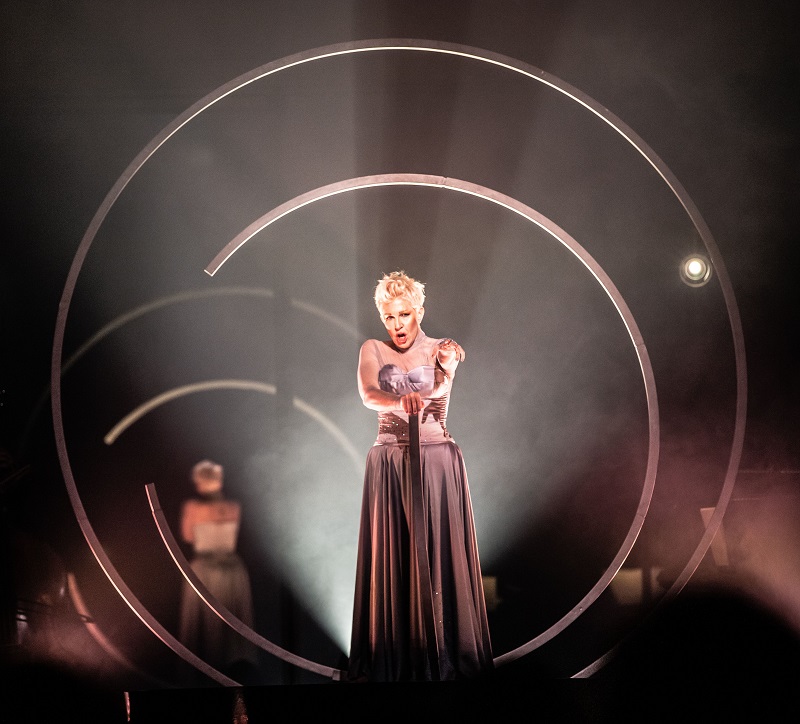DiDonato plants a seed in with ecology-themed, rock-show recital

In the last few years, the mezzo-soprano Joyce DiDonato has appeared in a series of art song recitals dressed up as significant dramatic events. Washington Performing Arts presented the latest one, an eco-conscious bit of virtue signaling she calls “Eden,” Sunday night in the Music Center at Strathmore with the early music ensemble Il Pomo d’Oro. The musicians have also just recorded the program for Erato.
More about the bells and whistles later, but high praise first for the quality of the music-making in this 90-minute concert, performed without an intermission. Maxim Emelyanychev conducted the start of the opening work, The Unanswered Question by Charles Ives, in near-total darkness. The string ensemble around him on the left side of the stage played limpid, long-breathed chords of fragile harmonies, from memory at first until their stand lights turned on.
DiDonato entered from the rear of the orchestra seating, taking the part Ives designated for “a solo instrument, preferably a trumpet.” In a repeated vocalise, she posed the melodic figure the composer called “the perennial question of existence.” Striding down the left aisle and across the front of the house, she made her way to a small platform mid-stage. In a third rhythmic universe, the woodwinds on the right answered her queries with querulous dissonances.
This served as an enigmatic introduction to Rachel Portman’s The First Morning of the World, a substantial song commissioned for the project. Set to text by Gene Scheer, its sentimental phrases are an ode to nature, which DiDonato has explained was a comfort to her during the pandemic lockdowns. Swirling figures in the flutes recalled a pastoral scene of trees with birds singing in them.
Next came “Ich atmet’ einen linden Duft,” a song from Mahler’s Rückert-Lieder about the smell of a branch cut from a linden tree. The unusual arrangement substituted the early music ensemble’s harpsichord and theorbo for the celesta and harp parts. DiDonato sang the slow-moving melody with consummate phrasing and control in soft dynamics.
As DiDonato sang “Con le stelle in Ciel che mai,” a strophic song from Biagio Marini’s Scherzi e canzone, assistants helped assemble other parts of the platform into two large circles. These formed an aureole around her head as if she were a Buddha statue or a costumed Brünnhilde escaped from a futuristic Ring Cycle. Mostly accompanied by theorbo and other continuo instruments, the piece also featured percussive strikes from the orchestra’s feet and a surprise turn by Emelyanychev on solo recorder.
The program had its best moments in 18th-century opera and oratorio excerpts, such as “Toglierò le sponde al mare,” an aria sung by the Angel of Justice in Josef Mysliveček’s Adamo ed Eva. Emelyanychev whipped his musicians into a fury, which supported the vocal edge from DiDonato in the piece’s searing lines. Unfortunately, he pushed them a little too loud for her at the climaxes of “Nature, the gentlest mother” from Copland’s Eight Poems of Emily Dickinson, where otherwise she was in optimal form.
Another interlude came with Giovanni Valentini’s Sonata “Enharmonica.” The strings on the left lobbed delicate passages in G minor, echoed by the opposing strings even more softly in the distant key of B minor, a moment of baroque bitonality, Ivesian avant la lettre.
DiDonato found an ideal vehicle in “Piante ombrose,” an aria from Francesco Cavalli’s La Calisto that did not strain the top part of her voice. Her strong chest voice featured richly in the first of two arias from Gluck’s Ezio, “Misera, dove son!” In the second, “Ah! non son io che parlo,” after a tender middle section, she embellished the da capo with fireworks.
Emelyanychev, whose hands were hard to see at times due to the dramatic lighting effects, had some trouble keeping his musicians together in the second aria. There was no such disjunction in a magnificent rendering of the celebrated “Danza degli spettri e delle furie” from Gluck’s Orfeo ed Euridice, given incisive speed and careful phrasing.
A final section grasped at eternity, first with “As with rosy steps the morn,” from Handel’s oratorio Theodora. DiDonato gave the piece a solemn sincerity, floating lovely embellishments on the da capo repeat. A fog machine added atmosphere for the final work on the program, the sublime “Ich bin der Welt abhanden gekommen” from Mahler’s Rückert-Lieder, featuring the plangent English horn.
Encores included the two final pieces from the recording, beginning with “Schmerzen” from Wagner’s Wesendonck Lieder, which taxed DiDonato’s top range unpleasantly. In a surprise appearance the red-shirted boys and girls of the Children’s Chorus of Washington joined DiDonato. Together they performed the schmaltzy song “Seeds of Hope,” put together by Mike Roberts from lyrics and melodies written last year by students at a school near London.
The final piece was the slow aria “Ombra mai fu” from Handel’s Serse, an opera about the man one might call the original tree-hugger. As described by Herodotus, the eccentric Xerxes halted his military campaign to admire an oriental plane tree so beautiful that he decorated it with gold and appointed a guardian over it.
After the first encore the Music Center underwent some sort of partial power outage, knocking out the sound system, kicking on some emergency lights, and activating occasional alarms outside the hall. This created roughly the same excitement as the light towers, rotating circles on the central platform, and fog machine that were part of the show, à la Lady Gaga.
The lack of supertitles kept the audience from focusing too much on the meaning of the German and Italian texts, which often had little to do with the ecological theme. If audience members do end up planting the little packets of cultivated wildflower seeds they received, as the tour makes its way to the 45 venues on five continents where it will be heard, so much the better.
Washington Performing Arts presents violinist Johnny Gandelsman in music of Bach, Davis, Assad, Swaminathan, and others 8 p.m. May 13. washingtonperformingarts.org